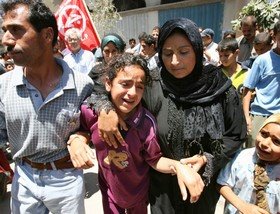Where are you from?
While this question is easy to answer most people, the case is different for Palestinians. When someone asks me “where are you from?” I honestly don’t know what to say. Should I tell them that I’m Syrian born, with Palestinian origins and Canadian by citizenship? Or should I give them the easy answer, the answer that will most likely make sense to them?
Are you from the country you’re born in? Or you from the country your family originally came from? Or are you from the country of which you’re a sole citizen of?
Although I was born in Syria, I don’t have a Syrian citizenship. In fact anyone who’s born in Syria and is from Palestinians origins does not get a Syrian citizenship. This is not because Syria discriminates against Palestinians, but rather, to keep the Palestinian identity alive and to keep the refugee issue in the forefront. So in Syria I’m not Syrian, but rather a “Palestinian-Syrian”.
But how can I not be a citizen of the country I was born in. Passports and citizenships aside, isn’t a person from the country that nurtured them, educated them, and provided them with opportunity to carry out a normal life? I have no memories of the Palestinian village where my family came from, but I do have memories of the streets of Homs and Damascus where I grew up. At the same time, I will always have some sort of attachment, although caused purely by imagination, to our Palestinian village. I want to see the scenes that my grandparents described to me, and (the now destroyed) house where my grandparents and some of my uncles and aunts grew up in. Every time I talk to my grandmother, I feel my Palestinian identify come alive. Does this longing to our village and my Palestinian roots make me Palestinian?
At the age of 12 I had no official citizenship. I did not have a passport, I belonged to a country that politically did not (and continues to not) exist, and that’s where Canada comes in. Canada gave me my first citizenship, and my first passport. For the first time ever, I officially belonged to a country. Some people will say “but you’re only Canadian on paper” but I would like to argue otherwise. In a couple of years I will have lived Canada as long as I lived in Syria. In fact, I spent in Canada the most important years of my life. I spent my teen years here, and now I’m spending the first years of my adulthood here. Canadian culture shaped me, and influenced me in the same way that it shaped and influenced Canadian-born Canadians, if you will. Does that make me Canadian then? Are you “from” the country that gave you your first citizenship?
I honestly don’t know the answers to any of the questions in this post. I gave it lots of though, and got nowhere. Do you see why it’s tough to give an answer to people who ask “where are you from?” I found out that no matter what I answer, someone will find a flaw in it, according to different people, I am “from” different countries.
As far as I’m concerned I think a person should be from the country there’re attached to the most. Picking between Syrian and Canada is quite tough. I love both countries, I’m proud of belonging to both, and I want the best for both. I will stand on both countries’ side in rough times. But what about Palestine? My sense of belonging to Palestine is different. While I hold no memories from there, deep inside I feel an attachment to our simple village, and my family’s history. So putting all that together what should I consider my self to be? What’s the answer that makes most sense to you?
 technorati tags: Syria, Palestine, Canada, Canadian, Palestinian, Syrian, Identity, Citizenship
technorati tags: Syria, Palestine, Canada, Canadian, Palestinian, Syrian, Identity, Citizenship
 technorati tags: Syria, Palestine, Canada, Canadian, Palestinian, Syrian, Identity, Citizenship
technorati tags: Syria, Palestine, Canada, Canadian, Palestinian, Syrian, Identity, Citizenship








